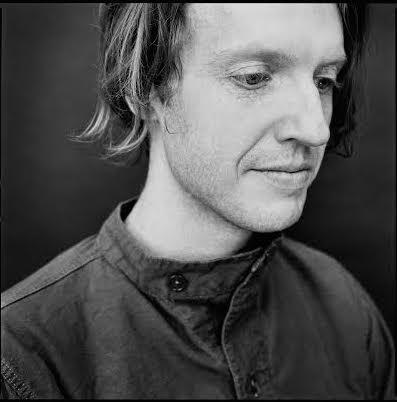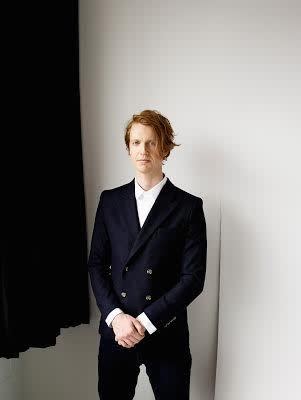Star Apps: Richard Reed Parry
When Arcade Fire multi-instrumentalist Richard Reed Parry produced his solo album of classical compositions, "Music for Heart and Breath," he made it as much for himself as he did for fans. "For me it has a centering quality and brings me in touch with some quality of quiet inner voice and inner rhythm that perhaps gets lost in one's daily life," he says. Parry is currently touring the album. I chatted with Richard Reed Parry about making the album, the challenges of working solo, his stage show, and his favorite apps.

With every beat of the heart, Richard Reed Parry's Music for Heart and Breath gets closer to you.
(Credit: Guillaume Simoneau)
What are the unique challenges one faces when doing an instrumental album?
Finding that elusive, ephemeral voice that can speak without using any literary devices, and finding that elusive quality that can imbue emotion or narrative without using anything literal. Also, finding sensitivities in absolutely raw materials, where you don't have anything to stand on, even in the way of established forms. It's really about finding that delicate balance and those qualities that allow the thing to speak, which takes time, until you have a piece of music that feels like itself or genuinely resonates.
Is there a narrative on the album?
I think it's about the piece rather than the record as a whole in terms of having a story -- and again it's not a literal story. It's more about finding the balance and trying to find something where you can feel the story, but you don't know what the story is necessarily. But I know how I want the thing to feel and how I want to feel listening to it. That's a kind of non-narrative storytelling, like Jackson Pollack working on a painting till it feels just right or resonates. But you don't know why it resonates or feels just right. You just keep working until it does.
How do you imagine that audiences will listen to this album?
I hope in a variety of different circumstances. I have friends who are osteopaths, and they've been responding enthusiastically. They said they use it when treating patients, because they say that it brings patients into their bodies to a place where they're easier to work on. That pleases me to no end that it's found itself in that way.
For me it has a centering quality and brings me in touch with some quality of quiet inner-voice and inner-rhythm that perhaps gets lost in one's daily life. It definitely had that effect on me, where it brought me in touch with that profoundly gentle quality that I would lose in my day-to-day life, filled with a frenetic amount of travel and performing. I would hope that it has that effect on people, that it would bring people back into contact with some quiet inner-speed and voice that needs to be actively listened to in order to hear it.
Is it common for you to listen to your own music?
It's not common once it's finished. It's very common for me to listen to something when it's in process. I usually record whatever I'm doing musically if I'm just playing around or decide to improvise with something alone or with the band when we're just jamming and making noise. I really love the quality of something that's unfinished in the recording, where you're making noise and seeing where it goes. I love that you can listen to it in a state of eternal possible perfectionism as opposed to something that's set in its flaws forevermore. I listen to my own unfinished stuff often, but not so much the released stuff.
Are there songs you look back on and wish you could tweak in some way?
There are things I wish I could delete. But that's the nature of the beast, so you just have to remember that it doesn't matter and have to let go. Nobody is scrutinizing your own career as much as you are. If I think that there's a totally stupid song on an Arcade Fire record, I have to remind myself that it's probably doing something for somebody else, and they're certainly not beating themselves up about it or seeing it as a burden, like an artist would.
On this album you have the artists play to their individual heartbeats. How did you accomplish that?
Technically every musician is always either following their own heartbeat, which they're listening to through a stethoscope, and they're playing notes at the speed of their own heartbeat, and there are various ways that the music stops and starts so that everyone is in the same space all the time. The music is constructed with enough flexibility so everyone is always taking cues from one person in the ensemble and waiting for them to be finished before doing the next thing; and at the same time, if they finish earlier, they stay quiet or repeat what they just did until everyone else has caught up.
Why was this idea intriguing to you?
In some ways it was the most organic and obvious concept as a way of forming music, having it bent around the internal rhythms and the heartbeat, which is the most fundamental rhythm that exists outside of the ocean. I thought that there has to be some music that only does this, that only uses the beat as the backbone of the music, but there hasn't been to this point. I wanted to reach a real deep, delicate, human quality without having to really explain that to the players. But with that technique it automatically does it without you having to think about that too hard.
The upside of working alone is more creative control. But what's the downside?
Obviously I'm alone, so everything comes back to my own questions and my own answers to those questions without someone else deciding or leaping in and answering it for you, which is the nature of any band. There's also where it gets to be this spacious music where you don't have input from anyone trying to fill the gaps, which naturally happens when you collaborate. But I really wanted this music to be spacious, patient, and slow and picking just the right notes and melodies and letting them sit there after they've been iterated, which is so hard in a group process. I got input in this situation as well, but nothing that I had to listen to.
When you're in the studio with Arcade Fire's seven members, how do you get your voice across?
There's a lot of give and take. You get your voice across, and sometimes that doesn't resonate for other people. Sometimes you play a part and lead the pack, and it just works and everyone agrees. Sometimes you try it, and it doesn't resonate with others. In a band whatever feels like the way forward for enough people ends up being the way forward. But sometimes you miss that band paradigm, which doesn't happen when you're on your own.
I'm trying to get a sense of your personality within the larger group. Let's say the Arcade Fire members were the Seven Dwarfs. Which dwarf would you be?
Doc, Grumpy, Happy, Sleepy, Bashful, Sneezy, and Dopey. I'm all of those dwarfs in the body of one very undwarf-like dude.
But what makes you unique from the others?
I was joking, but I wasn't joking. I think my personality changes wildly depending on the day. I can be the gentle one and the spacious one and the melancholic one, but I can also be the hyper one and the super imposing, loud one and frenetic one. I can really go both ways.
When you were making the new album, was your goal to capture the existing Arcade Fire fan base or to win a new one?
Yeah, a little bit. I was making the music to serve an entirely different musical agenda for me than Arcade Fire does. I wanted this to be an opposite experience: quietly and gently immersive, delicate, giving a lot of space, and pointing inward for the listener, as opposed to being super loud and extroverted and keeping you busy and occupied. I hope there's enough diversity in our audience and those interested in different things, not just the hyper and frenetic and extroverted and cacophonous. I think it's beautiful and unique music that people will benefit from listening to.

Parry hopes his delicate stage show transports listeners to a gentler, softer world.
(Credit: Guillaume Simoneau)
How did you translate this album for the stage?
Our show is an evening of supremely gentle, delicate, and gorgeous music that hopefully brings you into a gentle, soft world of some sort, and you get to experience a deep level of a certain kind of intimacy by being exposed to all these musicians literally playing their hearts out and breathing out. In knowing that that's what's happening, you will hopefully be able to experience that yourself, when you start listening to your own beat and just naturally start to line up what's going on inside of you with what's going on with the people onstage. That's a very particular experience that doesn't happen that often. So it's as much about what's happening inside of you and the people onstage as it is about the music.
How hands-on are you with production software?
Quite hands-on. For convenience's sake, I use Pro Tools, 'cause most people run it. I used to use Cubase , but nobody uses it around me, so I use it far less, because you just want everything to go quicker and smoother and not have to do weird exotic exports all the time.
What are your top five mobile apps?
1. I play chess a lot, so I have the Chess.com app that I use all the time before I go to bed.
2. I use Bloom, which is great if you want unobtrusive, gentle background music to calm you down that you have a little bit of input in.
3. There's a four-track studio app that I use called StudioMini, which is a miniature multitrack that I can sing ideas into and then sing against that.
4. I really like Vermont Public Radio or CBC Radio, which is Canada's national radio. I'll just listen because it makes me feel more like I'm at home, 'cause I travel so much.
5. I use my Voice Memos app when ideas strike, 'cause I immediately forget them. It's so basic and useful and what I've always wanted before iPhones even came out.

